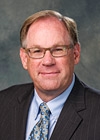Matthew Moen, University of South Dakota – Civility in Politics
 Political discussions are often uncivil.
Political discussions are often uncivil.
Matthew Moen, professor of political science at the University of South Dakota, delves into a few ideas to improve political discourse.
Matthew C. Moen currently serves as Dean of the College of Arts and Sciences, Lohre Distinguished Professor, and Professor of Political Science. Past roles include: President of the New England Political Science Association; Chair of the APSA Professional Ethics Committee; Elected Chair of the APSA Religion and Politics Division (twice); Member of the APSA Task Force on Interdisciplinarity; Section Chair for the Northeastern Political Science Association, the New England Political Science Association, and the Social Science History Association; Chair of the Department of Political Science and Director of the Congressional Fellowship Program at the University of Maine; and, a Congressional Fellow working in the U.S. House of Representatives.
Civility in Politics
Political incivility isn’t new—we’ve had some terrible episodes in our history. The Broadway musical Hamilton reminds us he was shot dead in a duel with a political rival.
And yet, we’ve clearly hit a low point, with a rancorous presidential race, Maine’s governor making vulgar remarks, Senate Republicans refusing to act on a Supreme Court nominee, and House Democrats sitting on the floor of the chamber in protest.
So here are some ideas.
Article IV requires members of Congress to swear an oath to defend the Constitution. Last changed in 1966, the oath could be changed again so that members must swear to respectfully discharge their duties.
The House allows one-minute speeches at the start of the legislative day, usually partisan zingers. Dispensing with them—recommended in a 1997 report to the House by Kathleen Hall Jamieson—would set a better tone.
Gerrymandering—the process of drawing legislative districts to advantage a political party—usually protects incumbents and polarizes politics by electing more extreme members. Switching to non-partisan commissions to draw district lines may be a better way, following the advice of former Justice John Paul Stevens to incorporate natural geography and contiguous population centers.
Finally, shifting to public financing of congressional elections—proposed long ago by Maryland Senator Charles McC. Mathias—would bust the cycle of special interests and constant fundraising, giving members more time to solve problems than the 139 days in session that Congress is averaging.
Ideas of uneven merit, but talking about ways to improve civility can be a small step toward more political civility.



In 1995… as a Senior political science major I took a seminar level class with our department’s chair Matt Moen. He assigned us Tocqueville’s “Democracy in America” to explain what was happening in the present and Carter’s ” a Culture of Disbelief” to speculate on the future. This says it all about Professor Moen’s ability to explain to and captivate his students.